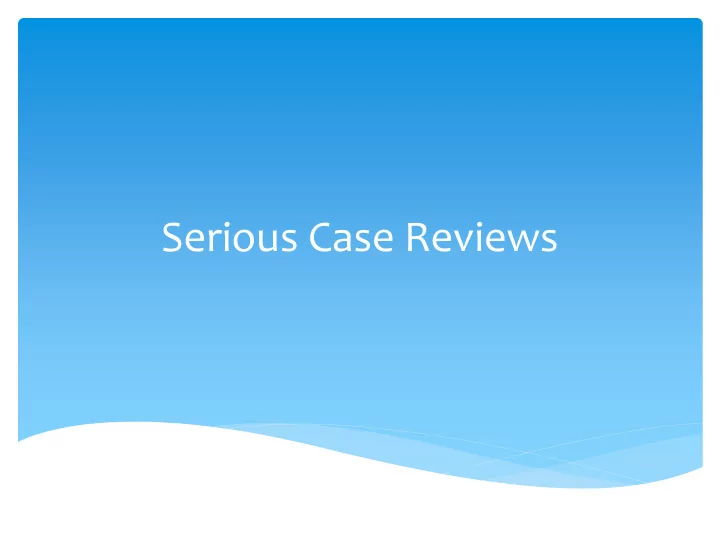

Serious Case Reviews
Terminology The Jersey Safeguarding Children Partnership Board is the equivalent of statutory Local Safeguarding Children Boards in England The Jersey Safeguarding Adult Partnership Board is the equivalent of statutory Safeguarding Adults Boards in England Through a Memorandum of Understanding, Jersey partners have committed to following the English statutory guidance “Working Together 2015” and The Care Act 2014
Being accountable Professionals and organisations that safeguard and protect children and adults must reflect on the quality of their services and learn from their own practice and that of others Good practice should be shared so that there is a growing understanding of what works well Conversely, when things go wrong there needs to be a rigorous, objective analysis of what happened and why, so that important lessons can be learnt and services improved to reduce the risk of future harm to children and adults
Types of reviews There are several types of reviews that look at practice when things appear to have gone wrong, including those that are undertaken by the Safeguarding Partnership Boards: Serious Case Reviews (SCRs) Child Death Reviews (a review of all child deaths up to the age of 18) Partnership Reviews of a child protection incident or a safeguarding adult incident which falls below the threshold for an SCR Reviews or audits of practice undertaken by single agencies Sudden unexpected incidents Serious incident reviews Management reviews
Serious Case reviews (SCRs) A SCR should be carried out where: abuse or neglect of a child or an adult is known or suspected; and either the child or adult has died; or been seriously harmed and there is cause for concern as to the way in which the SoJ Services, the Safeguarding Board Partners or others have worked together to safeguard the subject, and there is learning to be identified
Additional criteria In addition, even if one of these criteria are not met, an SCR should always be carried out when: a child dies in custody, on remand or following sentencing, in a secure children’s home, or where a child died by suspected suicide.
What is the purpose of SCRs? The main purpose of SCRs is to ensure that agencies learn lessons from experience, and consequently improve the way they work to safeguard children and adults In order to achieve this, the SCR must be • Timely • Comprehensive and • Rigorously carried out • With independent elements • Child/adult focused
SCR Review Principles The SCR process should be transparent, with the findings made public, unless this is not in the interests of the child/adult or family The decision as to whether to undertake an SCR and whether to publish the findings is that of the Independent Chair of the SPB
SCRs are not… An inquiry into how a child or adult died or was seriously harmed An inquiry into who is responsible Part of a disciplinary process relating to individual practitioners If required, these processes will be conducted separately from the SCR by the relevant agencies, the law or Viscount’s department.
SCR Review Principles SCRs and other case reviews must: recognise complex circumstances in which professionals work together to safeguard children; understand precisely who did what and why involve discussions with front-line staff and the family/subject not use hindsight, but understand practice as it was at the time Be transparent about the way data is collected and analysed; and makes use of relevant research and case evidence to inform the findings.
The overview report The Independent Overview Author produces a report that: Comments on how well the SCR process was carried out Evaluates the information provided by all agencies Includes the views of the family or subject Identifies any good practice Identifies the lessons to be learned Makes recommendations
Barriers-what prevents lessons from being learned? The length of time it takes to complete SCRs The political and media response Poor dissemination of the findings The amount of new policies and procedures recommended can be overwhelming The language used can prevent understanding by the public and all agencies Concerns about publication, confidentiality Lack of appropriate training across all sectors Lack of engagement in the SCR process by practitioners, the child or adult and families
Useful research and other materials Working Together to Safeguard Children 2015- UK statutory guidance Care Act statutory guidance 2015 http://www.scie.org.uk/publications/elearning ‘Preventing Child Deaths’ Sharon Vincent 2013 ‘ Hidden Harm-Hidden Harm – Responding to the needs of children of problem drug users’ 2003 ‘Swept Under the Carpet’ 2010 Hagell (1998) ‘Dangerous Care’ DfE research study into the ‘Barriers to learning from SCRs and ways to overcome this’ NSPCC National Case Review repository (http://www.nspcc.org.uk/preventing-abuse/child-protection-system/case- reviews/) The Ten Pitfalls of Child protection and How to Avoid them
Recommend
More recommend